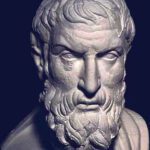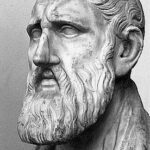We zagen in een eerder bericht al de relatie tussen de stoïcijnse filosoof Epictetus en de Romeinse keizer Marcus Aurelius. Hier, in dit bericht, richten we onze aandacht op Marcus.
Marcus Aurelius Antoninus (121-180) was een Romeinse keizer van 161 tot 180 en een stoïcijnse filosoof. Hij was de laatste van de heersers die bekend staan als de Vijf Goede Keizers (een term die zo’n dertien eeuwen later werd bedacht door Niccolò Machiavelli), en de laatste keizer van de Pax Romana (27 v.Chr. tot 180), een tijdperk van relatieve vrede en stabiliteit voor de Romeinse rijk.
Marcus Aurelius
Marcus werd geboren tijdens het bewind van Hadrianus als zoon van de neef van de keizer, de praetor Marcus Annius Verus, en de erfgename Domitia Calvilla. Zijn vader stierf toen hij drie was, en zijn moeder en grootvader voedden Marcus op. Nadat de adoptiezoon van Hadrianus, Aelius Caesar, in 138 stierf, adopteerde de keizer Marcus’ oom Antoninus Pius als zijn nieuwe erfgenaam. Antoninus adopteerde op zijn beurt Marcus en Lucius, de zoon van Aelius. Hadrianus stierf dat jaar en Antoninus werd keizer. Marcus, nu troonopvolger, studeerde Grieks en Latijn onder docenten als Herodes Atticus en Marcus Cornelius Fronto. Jarenlang onderhield hij nauwe correspondentie met Fronto.
Marcus trouwde in 145 met Antoninus’ dochter Faustina.
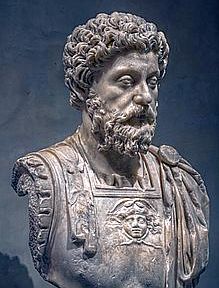
Twee keizers
Nadat Antoninus in 161 stierf, besteeg Marcus de troon samen met zijn adoptiebroer, die de naam Lucius Verus aannam. Hoewel Marcus geen persoonlijke genegenheid voor Hadrianus toonde (het is veelzeggend dat hij hem niet bedankt in het eerste boek van zijn Meditaties), geloofde hij vermoedelijk dat het zijn plicht was om de opvolgingsplannen van de man uit te voeren. Dus hoewel de senaat van plan was Marcus alleen te bekrachtigen, weigerde hij aan te treden tenzij Lucius gelijke bevoegdheden kreeg. Het was de eerste keer dat Rome door twee keizers werd geregeerd.
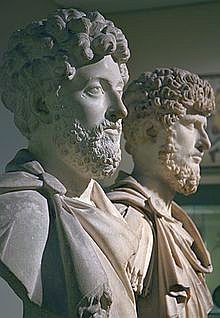
Militaire conflicten
De regering van Marcus Aurelius werd gekenmerkt door militaire conflicten. In het Oosten vocht het Romeinse Rijk met succes tegen een nieuw leven ingeblazen Parthische Rijk en het rebellenkoninkrijk Armenië. Marcus versloeg de Marcomannen in de Marcomannenoorlogen; deze en andere Germaanse volkeren begonnen echter een verontrustende realiteit voor het rijk te vertegenwoordigen.
Pest
De Antonijnse Pest brak uit in 165 of 166 en verwoestte de bevolking van het Romeinse Rijk, waarbij vijf miljoen mensen om het leven kwamen. Lucius Verus is mogelijk in 169 aan de pest gestorven.
In tegenstelling tot sommige van zijn voorgangers koos Marcus ervoor geen erfgenaam te adopteren. Tot zijn kinderen behoorden Lucilla, die met Lucius trouwde, en Commodus, wiens opvolging na Marcus een onderwerp van discussie is geweest. De zuil en het ruiterstandbeeld van Marcus Aurelius staan nog steeds in Rome, waar ze werden opgericht ter ere van zijn militaire overwinningen.
Meditaties
De Meditaties (‘dingen voor jezelf’), de geschriften van ‘de filosoof’ – zoals hedendaagse biografen Marcus noemden, zijn een belangrijke bron van het moderne begrip van de oude stoïcijnse filosofie. Ze zijn eeuwen na zijn dood geprezen door collega-schrijvers, filosofen, vorsten en politici.
Marcus Aurelius schreef de twaalf meditatieboeken in het Koine-Grieks als bron voor zijn eigen begeleiding en zelfverbetering. Het is mogelijk dat grote delen van het werk in Sirmium zijn geschreven, waar hij veel tijd besteedde aan het plannen van militaire campagnes van 170 tot 180. Een deel ervan werd geschreven terwijl hij in Aquincum op campagne was in Pannonië, omdat interne aantekeningen ons vertellen dat de het eerste boek werd geschreven toen hij campagne voerde tegen de Quadi aan de rivier de Granova (het huidige Hron) en het tweede boek werd in Carnuntum geschreven.
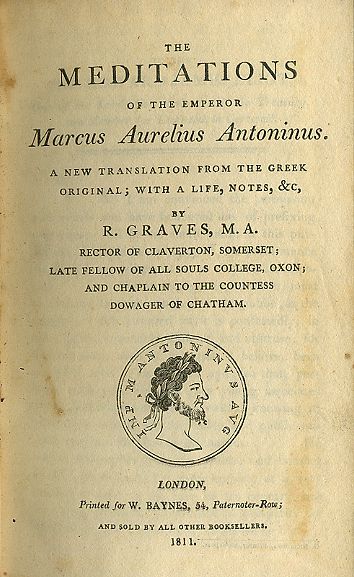
Het is onwaarschijnlijk dat Marcus Aurelius ooit de bedoeling had gehad dat de geschriften zouden worden gepubliceerd. Het werk heeft geen officiële titel, dus “Meditaties” is een van de vele titels die gewoonlijk aan de collectie worden toegekend. Deze geschriften hebben de vorm van citaten die in lengte variëren van één zin tot lange paragrafen.
Het centrale thema van meditatie
Een centraal thema bij meditaties is het belang van het analyseren van iemands oordeel over zichzelf en anderen en het ontwikkelen van een kosmisch perspectief:
‘Je hebt de macht om veel overbodige problemen weg te nemen die geheel in je oordeel liggen, en om een grote ruimte voor jezelf te bezitten waarin je in gedachten de hele kosmos omarmt, om de eeuwige tijd te overwegen, om na te denken over de snelle verandering in de delen van elk ding, van hoe kort het is vanaf de geboorte tot de ontbinding, en hoe de leegte vóór de geboorte en die na de ontbinding even oneindig zijn‘.
Aurelius pleit ervoor om je plaats in het universum te vinden en ziet dat alles uit de natuur voortkomt, en dat alles er dus te zijner tijd weer naar zal terugkeren. Een ander sterk thema is het behouden van de focus en het tegelijkertijd zonder afleiding zijn van sterke ethische principes zoals ‘een goed mens zijn‘.
Zijn stoïcijnse ideeën gaan vaak gepaard met het vermijden van toegeeflijkheid aan zintuiglijke genegenheden, een vaardigheid die een mens zal bevrijden van de pijn en genoegens van de materiële wereld. Hij beweert dat de enige manier waarop een mens door anderen kan worden geschaad, is door toe te staan dat zijn reactie hem overmeestert.
Eerste vermelding
De eerste directe vermelding van het werk komt van Arethas van Caesarea (ca. 860–935), een bisschop die een groot verzamelaar van manuscripten was. Ergens rond 907 stuurde hij een deel van de Meditaties naar Demetrius, aartsbisschop van Heracleia, met een brief waarin stond: ‘Ik heb al een tijdje een oud exemplaar van het meest interessante boek van keizer Marcus, zo oud zelfs dat het helemaal in verval raakt. stukken.… Dit heb ik laten kopiëren en kan het in zijn nieuwe jurk aan het nageslacht doorgeven.‘
De huidige tekst is vrijwel volledig gebaseerd op twee manuscripten. Een daarvan is de Codex Palatinus, ook bekend als de Codex Toxitanus, voor het eerst gepubliceerd in 1558/9 maar nu verloren gegaan. Het andere manuscript is de Codex Vaticanus in de Vaticaanse Bibliotheek.
Ontvangst
Marcus Aurelius wordt geprezen om zijn vermogen ‘om op te schrijven wat er in zijn hart was, precies zoals het was, niet verduisterd door enig besef van de aanwezigheid van luisteraars of enig effectbejag‘.
Gilbert Murray (een uitmuntend geleerde op het gebied van de taal en cultuur van het oude Griekenland) schrijft: ‘Mensen begrijpen Marcus niet, niet vanwege zijn gebrek aan zelfexpressie, maar omdat het voor de meeste mannen moeilijk is om te adem te halen op dat intense hoogtepunt van spiritueel bewustzijn. leven, of op zijn minst nuchter adem te halen.”
